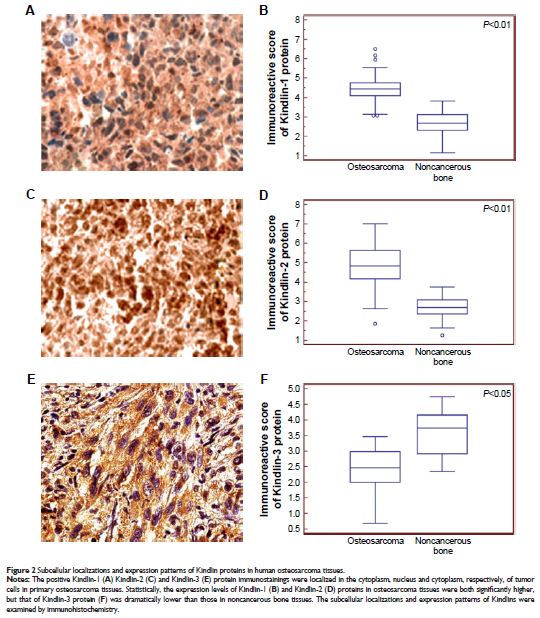109568
论文已发表
注册即可获取德孚的最新动态
IF 收录期刊
- 3.4 Breast Cancer (Dove Med Press)
- 3.2 Clin Epidemiol
- 2.6 Cancer Manag Res
- 2.9 Infect Drug Resist
- 3.7 Clin Interv Aging
- 5.1 Drug Des Dev Ther
- 3.1 Int J Chronic Obstr
- 6.6 Int J Nanomed
- 2.6 Int J Women's Health
- 2.9 Neuropsych Dis Treat
- 2.8 OncoTargets Ther
- 2.0 Patient Prefer Adher
- 2.2 Ther Clin Risk Manag
- 2.5 J Pain Res
- 3.0 Diabet Metab Synd Ob
- 3.2 Psychol Res Behav Ma
- 3.4 Nat Sci Sleep
- 1.8 Pharmgenomics Pers Med
- 2.0 Risk Manag Healthc Policy
- 4.1 J Inflamm Res
- 2.0 Int J Gen Med
- 3.4 J Hepatocell Carcinoma
- 3.0 J Asthma Allergy
- 2.2 Clin Cosmet Investig Dermatol
- 2.4 J Multidiscip Healthc

Kindlin 蛋白在人骨肉瘤中的预后意义
Authors Ning K, Zhang H, Wang Z, Li K
Received 22 October 2016
Accepted for publication 21 November 2016
Published 7 February 2017 Volume 2017:10 Pages 657—665
DOI https://doi.org/10.2147/OTT.S125418
Checked for plagiarism Yes
Review by Single-blind
Peer reviewers approved by Dr Akshita Wason
Peer reviewer comments 3
Editor who approved publication: Dr Ingrid Espinoza
Abstract: The Kindlin protein family, comprising Kindlin-1, Kindlin-2 and
Kindlin-3, play important roles in various human cancers. Here, to explore the
clinical significance of Kindlins in human osteosarcomas, quantitative
real-time PCR and Western blot analyses were performed to detect the expression
of Kindlin-1, Kindlin-2 and Kindlin-3 mRNAs and proteins in 20 self-pairs of
osteosarcoma and adjacent noncancerous tissues. Then, immunohistochemistry was
performed to examine subcellular localizations and expression patterns of
Kindlin proteins in 100 osteosarcoma and matched adjacent noncancerous tissues.
Kindlin-1, Kindlin-2 and Kindlin-3 protein immunostainings were localized in
the cytoplasm, nucleus and cytoplasm, respectively, of tumor cells in primary
osteosarcoma tissues. Statistically, the expression levels of Kindlin-1 and
Kindlin-2 mRNAs and proteins in osteosarcoma tissues were all significantly
higher (both P <0.01), but those of Kindlin-3
mRNA and protein were both dramatically lower (both P <0.05), than in
matched adjacent noncancerous tissues. In addition, the overexpressions of
Kindlin-1 and Kindlin-2 proteins were both significantly associated with high
tumor grade (both P =0.01), presence of metastasis
(both P =0.006),
recurrence (both P =0.006) and poor response to
chemotherapy (both P =0.02). Moreover, Kindlin-1 and
Kindlin-2 expressions were both identified as independent prognostic factors
for overall (both P =0.01) and disease-free (P =0.02 and 0.01, respectively)
survivals of osteosarcoma patients. However, no associations were observed
between Kindlin-3 expression and various clinicopathologic features and
patients’ prognosis. In conclusion, aberrant expression of Kindlin-1 and
Kindlin-2 may function as reliable markers for progression and prognosis in
osteosarcoma patients, especially for tumor recurrence.
Keywords: osteosarcoma, Kindlin protein family,
clinicopathologic feature, overall survival, disease-free survival
